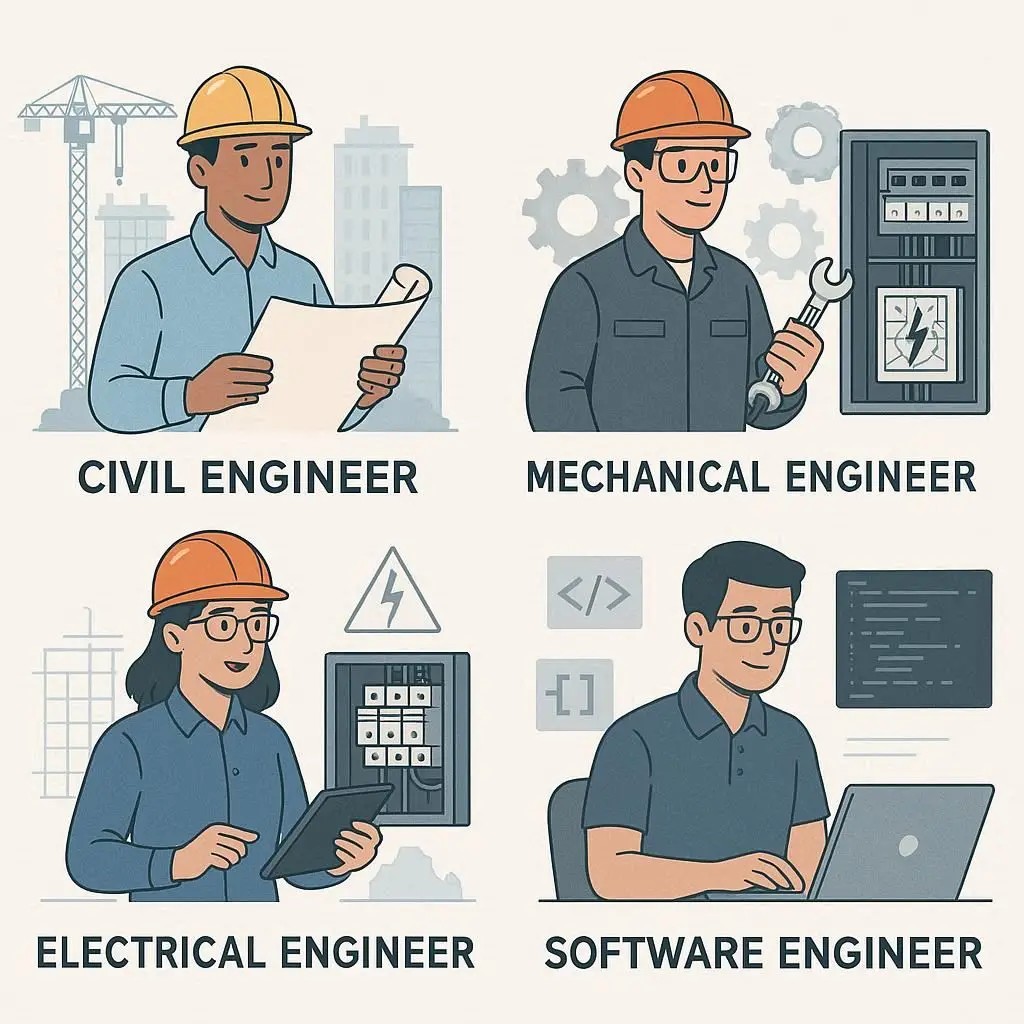What are these types of Engineers called?
Engineers are professionals who apply science, math, and technology to design, build, and improve systems, machines, structures, and processes. There are many branches of engineering, each with its own focus. Here’s a breakdown of the main types of engineers and what they are called:
Major Types of Engineers
Mechanical Engineers – Design and build machines, engines, vehicles, and manufacturing systems.
Civil Engineers – Plan and construct infrastructure such as bridges, roads, buildings, and dams.
Electrical Engineers – Work with electrical systems, power generation, circuits, and electronics.
Computer Engineers – Combine hardware and software expertise to develop computer systems.
Software Engineers – Design and develop software applications and operating systems.
Chemical Engineers – Apply chemistry and biology to develop processes for fuels, food, drugs, and materials.
Industrial Engineers – Optimize systems, workflows, and processes to improve efficiency and reduce waste.
Aerospace Engineers – Design aircraft, spacecraft, satellites, and defense systems.
Biomedical Engineers – Develop medical devices, prosthetics, imaging systems, and biotechnology solutions.
Environmental Engineers – Create systems to solve environmental problems (water, air, waste, sustainability).
Materials Engineers – Develop and test new materials like metals, polymers, ceramics, and composites.
Nuclear Engineers – Design and maintain nuclear power systems and radiation technologies.
Petroleum Engineers – Explore and extract oil and natural gas.
Marine or Ocean Engineers – Design ships, submarines, and ocean structures.
Agricultural Engineers – Work on farming equipment, irrigation systems, and food production technologies.
Emerging / Specialized Types
Robotics Engineers – Create robots and automation systems.
Data Engineers – Design data pipelines and infrastructure for big data.
Cybersecurity Engineers – Protect networks and systems from cyber threats.
AI/ML Engineers – Build artificial intelligence and machine learning systems.
Mechatronics Engineers – Combine mechanical, electronic, and computer engineering for smart devices.
Systems Engineers – Manage and integrate complex projects across multiple disciplines.
How They’re Called
Engineers are usually named after their field, for example:
Someone in mechanical engineering is called a Mechanical Engineer.
Someone in biomedical engineering is called a Biomedical Engineer.
Someone in cybersecurity engineering is called a Cybersecurity Engineer.
In short: Engineers are called by the name of their specialty—Mechanical Engineer, Civil Engineer, Electrical Engineer, Software Engineer, etc.—with many traditional fields and new ones emerging as technology evolves.
Types of Engineers and Their Specializations
Engineering is a vast and dynamic field with numerous specializations, each focusing on different applications of scientific and mathematical principles to solve problems and innovate. From designing towering skyscrapers to developing life-saving medical devices, engineers are at the forefront of technological advancement. The types of engineers are generally categorized by broad disciplines, which then branch into more specific specializations. For instance, Mechanical Engineering might include specializations in robotics, automotive design, or thermodynamics, while Electrical Engineering could focus on power systems, electronics, or telecommunications.
Common Engineering Disciplines
Here are some of the most common and influential engineering disciplines:
Civil Engineering: Focuses on the design, construction, and maintenance of the physical and naturally built environment, including roads, bridges, canals, dams, airports, sewage systems, pipelines, and structural components of buildings.
Mechanical Engineering: Deals with the design, analysis, manufacturing, and maintenance of mechanical systems. This includes everything from small individual parts and devices to large systems like industrial machinery, engines, and robotics.
Electrical Engineering: Involves the study and application of electricity, electronics, and electromagnetism. This field covers power generation and transmission, telecommunications, computing hardware, and control systems.
Chemical Engineering: Applies principles of chemistry, physics, mathematics, and biology to design, operate, and optimize processes for producing, transforming, and transporting chemicals, materials, and energy.
Computer Engineering: Combines elements of electrical engineering and computer science, focusing on the design of computer hardware and software, and integrating them into larger systems.
Aerospace Engineering: Specializes in the design, construction, and science of aircraft and spacecraft. It has two major inter-related branches: aeronautical engineering and astronautical engineering.
Biomedical Engineering: Integrates physical, chemical, mathematical, and computational sciences and engineering principles to study biology and medicine, aiming to improve healthcare.
Environmental Engineering: Focuses on protecting the environment by reducing waste and pollution, and improving public health. This includes water and wastewater treatment, air pollution control, and hazardous waste management.
Roles and Responsibilities of Each Type
The day-to-day roles and responsibilities of engineers vary greatly by their specialization:
Civil Engineers might oversee construction projects, analyze structural integrity, or plan urban development.
Mechanical Engineers could be designing new engine components, testing prototypes of robotic arms, or optimizing manufacturing processes.
Electrical Engineers might develop new circuits, design power grids, or program embedded systems.
Chemical Engineers often work on developing new materials, improving production efficiency in chemical plants, or designing pharmaceutical processes.
Computer Engineers might be involved in designing microprocessors, developing operating systems, or creating network architectures.
Aerospace Engineers design aircraft structures, propulsion systems, or satellite communication systems.
Biomedical Engineers develop artificial organs, medical imaging equipment, or prosthetics.
Environmental Engineers design waste management facilities, assess environmental impact, or develop renewable energy solutions.
Educational Requirements for Different Engineers
A strong educational foundation is paramount for all engineering careers.
Bachelor's Degree: Most entry-level engineering positions require a Bachelor of Science (B.S.) degree in a specific engineering discipline from an accredited program. These programs typically take four years to complete and include rigorous coursework in mathematics, physics, chemistry, and specialized engineering subjects.
Master's and Ph.D. Degrees: For advanced research, teaching, or highly specialized roles, a Master's (M.S.) or Doctorate (Ph.D.) degree is often preferred or required. These graduate programs allow engineers to delve deeper into a particular area of expertise.
Licensure: For some engineering roles, particularly those that involve public safety (like many Civil Engineering positions), a Professional Engineer (PE) license is required. This involves passing a Fundamentals of Engineering (FE) exam, gaining several years of work experience, and then passing a Principles and Practice of Engineering (PE) exam.
Career Opportunities in Various Engineering Fields
Career opportunities for engineers are diverse and robust, with strong demand across numerous industries.
Civil Engineers: Work in government agencies, private construction firms, consulting, and urban planning.
Mechanical Engineers: Find roles in automotive, aerospace, manufacturing, robotics, and energy sectors.
Electrical Engineers: Are employed in telecommunications, power utilities, electronics manufacturing, and computer hardware companies.
Chemical Engineers: Work in pharmaceuticals, petrochemicals, food and beverage, and environmental industries.
Computer Engineers: Have opportunities in software development, hardware design, cybersecurity, and IT consulting.
Aerospace Engineers: Work for aircraft manufacturers, space agencies, and defense contractors.
Biomedical Engineers: Are found in medical device companies, hospitals, research institutions, and pharmaceutical firms.
Environmental Engineers: Work for government environmental agencies, consulting firms, and industries focused on sustainability and resource management.
The constant evolution of technology ensures that engineering remains a field with continuous innovation and new career paths emerging regularly.













